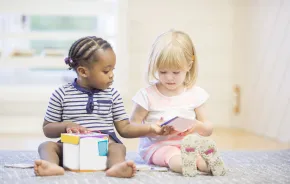 Your best friend’s daughter is talking up a storm while your child is taking a bit longer to become so verbal.
Your best friend’s daughter is talking up a storm while your child is taking a bit longer to become so verbal.
Doctors and experts are quick to reassure parents that there’s a wide range of timing for developmental milestones, but many parents can’t help but wonder: Does it matter when kids learn to talk?
Language milestones do matter — and it’s important we understand them, says Gina Lebedeva, a specialist at the Institute for Learning & Brain Sciences (I-LABS) at the University of Washington. Research conducted at I-LABS and by other experts around the country shows a strong connection between early and later communication skills.
“Communication skills through the first two years of life strongly predict language at age 5,” Lebedeva explains. “It’s not just about the obvious indicators, such as number of words, it’s about how children are tuning in and engaging with the people around them.”
Early signs of communication
Signs of communication skills appear long before words. Babies should be able to tell the difference between different kinds of sounds and languages; they should follow a parent’s gaze; babble and point; and begin to communicate using gestures and vocalizations. These early skills can be used to predict later language abilities.
Toddlers reach a turning point for language starting at about 18 months of age. Until then, kids can typically say a few dozen words. After that, the gap widens. Studies show that by age 3, children vary in verbal abilities, sometimes by several hundreds of words.
What causes this disparity? According to Lebedeva, “Learning begets future learning.” That is, once a child builds a foundation of language, these skills rapidly build upon each other. And the more language children are exposed to, the more words they learn.
Though most of the conversation around a typical toddler’s house revolves around Play-Doh, playdates and potty training, a well-known study by Betty Hart, Ph.D., and Todd Risley, Ph.D., at the University of Kansas found tremendous differences among the actually number of words that toddlers hear per day.
Toddlers whose parents were of a professional class heard, on average, 1,500 words per hour. Toddlers in working-class families heard 900 words per hour, while those in welfare-class families heard only 600 words per hour. These differences added up to almost 30 million words by the time the children reached school age.
All parents have the ability to impact their children’s language development by making sure they are surrounded by rich vocabulary. “In general, the frequency of social interaction and the amount of language a child hears (especially directed toward them) is critical for a child’s acquisition of language,” says Kalli Goodwin, a speech-language pathologist at the Boyer Children’s Clinic in Seattle.
Interaction is important
Parents can help their child go from babble to fluent speech in one very powerful way: by responding to them. Studies by experts such as Michael Goldstein, Ph.D., at Cornell University have found that responding to early vocalizations with words and touch can significantly boost an infant’s language skills.
It’s the personal one-on-one interaction that’s important. “Put away the DVDs and flashcards, and make sure there is lots of love, talk, books and play in your child’s life. Genetics has a role, but the interplay between genetics and experiences is what really drives learning,” says Lebedeva.
If your child is slow to reach the typical language milestones, there may be no need to worry, says Goodwin. Many factors affect the timeline of speech and language development. For example, a child who is slower to develop physical factors such as muscle tone or coordination in parts of the body that are important for speech (lungs, face, jaw, tongue, lips, vocal chords) may have verbal delays.
Gender can also play a role, Goodwin says. Girls typically (though not always) start using words earlier than boys. Environmental and social factors are also important, such as the amount and quality of interaction with peers.
But Lebedeva says that parents should pay close attention to late-talking toddlers. Watch for their overall comprehension abilities and their use of gestures, both important clues to whether these kids need more help or are simply late bloomers. Early identification of potential difficulties is critical, and early intervention before age 2 can make a big difference, she says.
Parents who pay attention to the development process, rather than focusing too much on milestones, can help gauge their child’s progress. “While not every child enters this world with the exact same skills necessary for speech and language, a caregiver who is willing to take on the part of teacher and playmate will help their child reach their full potential,” says Goodwin.
Chera Prideaux is a Seattle freelance writer and mother of a toddler.









